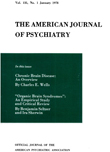CLINICAL REPORT ON THE USE OF THE DIMETHYL ETHER OF D-TUBOCURARINE IODIDE IN ELECTROSHOCK THERAPY
Abstract
1. Clinical observations were made during 135 injections of dimethyl d-tubocurarine iodide to 41 patients receiving electroshock treatment. In 10 of these patients the amount of relaxation produced by head-drop doses of d-tubocurarine chloride was compared with that produced by dimethyl d-tubocurarine iodide by methods of clinical observation and by studies of blood lactic acid levels.
2. Although d-tubocurarine chloride seems to produce consistently greater relaxation when given in equivalent head-drop doses, the clinically observed difference is not sufficient to offset the hazard of severe respiratory embarrassment that is encountered with the drug.
3. With administration of dimethyl d-tubocurarine iodide we saw no cases of respiratory embarrassment sufficient to warrant the use of oxygen.
4. It is concluded from this study that dimethyl d-tubocurarine iodide seems to be a safe and useful drug to produce a lessening of the severity of convulsions in electroshock therapy.
Access content
To read the fulltext, please use one of the options below to sign in or purchase access.- Personal login
- Institutional Login
- Sign in via OpenAthens
- Register for access
-
Please login/register if you wish to pair your device and check access availability.
Not a subscriber?
PsychiatryOnline subscription options offer access to the DSM-5 library, books, journals, CME, and patient resources. This all-in-one virtual library provides psychiatrists and mental health professionals with key resources for diagnosis, treatment, research, and professional development.
Need more help? PsychiatryOnline Customer Service may be reached by emailing [email protected] or by calling 800-368-5777 (in the U.S.) or 703-907-7322 (outside the U.S.).



